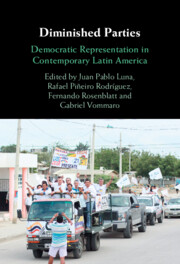Book contents
- Diminished Parties
- Diminished Parties
- Copyright page
- Contents
- Figures
- Tables
- Contributors
- Acknowledgments
- Abbreviations
- 1 Introduction
- 2 The Case of Uruguay’s Frente Amplio
- 3 Horizontal Coordination and Vertical Aggregation Mechanisms of the PRO in Argentina and Its Subnational Variations
- 4 Bolivia’s Movement toward Socialism: A Political Party Based on and Anchored in Social Movements
- 5 The Complex Interaction between Vertical Interest Aggregation and Horizontal Coordination: The PRD and MORENA in Mexico
- 6 PLN and PAC: Two Costa Rican Parties with Constituencies Evolving in Opposite Directions
- 7 The Case of the Traditional Parties in Paraguay
- 8 The Colombian Liberal Party and Conservative Party: From Political Parties to Diminished Subtypes
- 9 “Normal” Parties in Extraordinary Times: The Case of Primero Justicia and Voluntad Popular in Venezuela
- 10 Diminished by Design: Ecuador’s Alianza PAIS
- 11 The Chilean PPD: A Loose Confederation of Leaders
- 12 Fujimorismo and the Limits of Democratic Representation in Peru, 2006–2020
- 13 The Unidad Nacional de la Esperanza: Guatemala’s Only True Political Party?
- 14 Conclusions
- References
- Name Index
- Organization Index
- Subject Index
13 - The Unidad Nacional de la Esperanza: Guatemala’s Only True Political Party?
Published online by Cambridge University Press: 09 December 2021
- Diminished Parties
- Diminished Parties
- Copyright page
- Contents
- Figures
- Tables
- Contributors
- Acknowledgments
- Abbreviations
- 1 Introduction
- 2 The Case of Uruguay’s Frente Amplio
- 3 Horizontal Coordination and Vertical Aggregation Mechanisms of the PRO in Argentina and Its Subnational Variations
- 4 Bolivia’s Movement toward Socialism: A Political Party Based on and Anchored in Social Movements
- 5 The Complex Interaction between Vertical Interest Aggregation and Horizontal Coordination: The PRD and MORENA in Mexico
- 6 PLN and PAC: Two Costa Rican Parties with Constituencies Evolving in Opposite Directions
- 7 The Case of the Traditional Parties in Paraguay
- 8 The Colombian Liberal Party and Conservative Party: From Political Parties to Diminished Subtypes
- 9 “Normal” Parties in Extraordinary Times: The Case of Primero Justicia and Voluntad Popular in Venezuela
- 10 Diminished by Design: Ecuador’s Alianza PAIS
- 11 The Chilean PPD: A Loose Confederation of Leaders
- 12 Fujimorismo and the Limits of Democratic Representation in Peru, 2006–2020
- 13 The Unidad Nacional de la Esperanza: Guatemala’s Only True Political Party?
- 14 Conclusions
- References
- Name Index
- Organization Index
- Subject Index
Summary
Unidad Nacional de la Esperanza (National Unit of Hope, UNE) has been Guatemala’s most successful electoral vehicle in the democratic period. The UNE’s architects aimed to construct a programmatic and institutionalized political party. However, it is a formation that has much more in common with the modal Guatemalan electoral vehicle. An empirical evaluation of the UNE’s horizontal coordination and vertical aggregation capabilities reveals that, as an organization, it fails along both dimensions. Central-to-local party coordination, campaign strategy harmonization, and party loyalty in the legislature are limited. Pervasive factionalism within the UNE, weak mechanisms of harmonization, as well as the autonomy of local and regional caudillos, restrict possibilities for horizontal coordination. The UNE did construct an intertemporally loyal clientele of voters via a politicized cash-transfer program. But its ability to represent and develop organic linkages with society were limited by the stranglehold of party financiers, the absence of encompassing societal mobilizing structures, the abysmal disparity in relational power between the private sector and social sectors, and other factors.
- Type
- Chapter
- Information
- Diminished PartiesDemocratic Representation in Contemporary Latin America, pp. 264 - 288Publisher: Cambridge University PressPrint publication year: 2021



